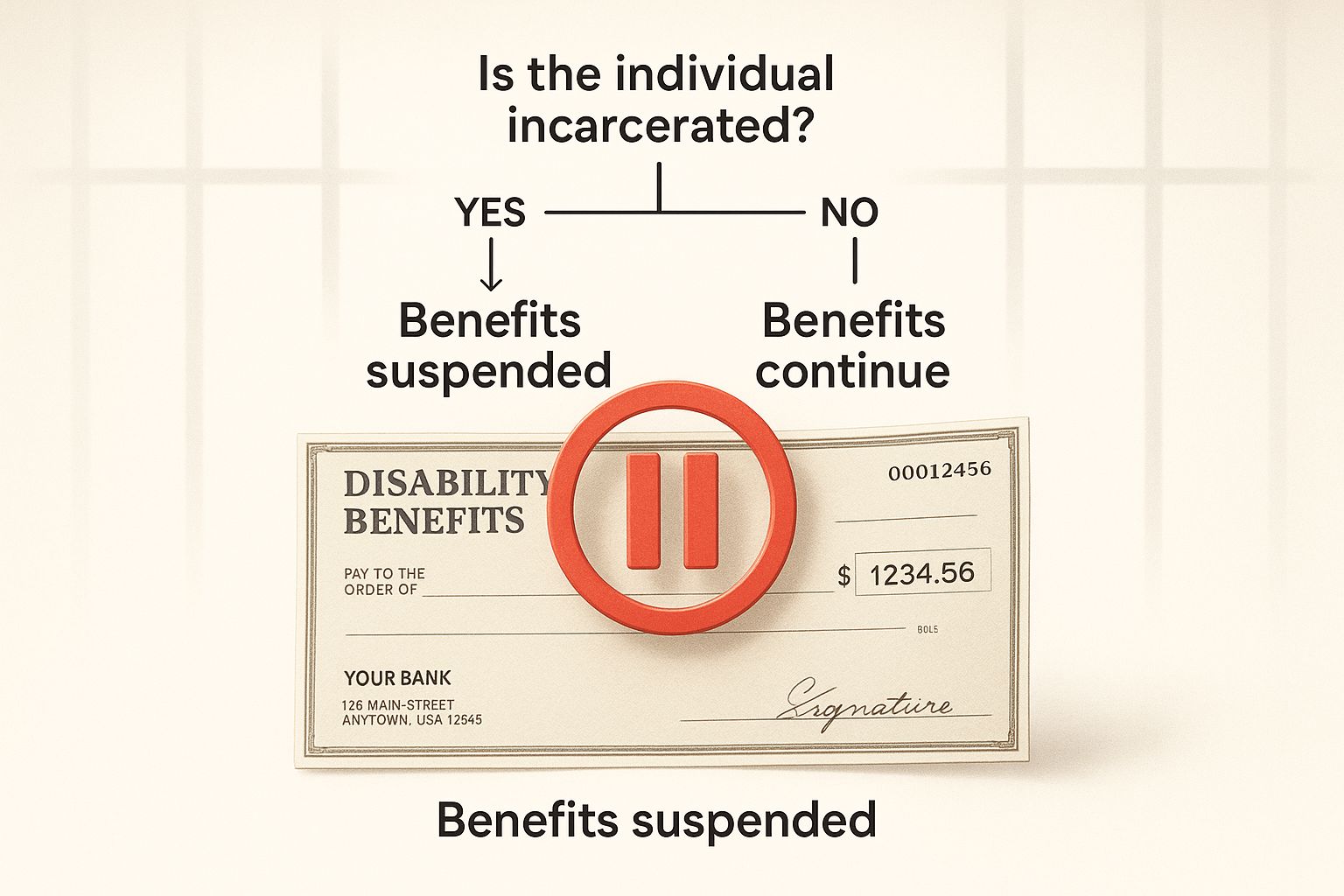Can a Felon Get Social Security Disability?
"I was satisfied once John Bell took over my case."
"Communication was always timely."
Can a Felon Get Social Security Disability?
It’s a question that weighs heavily on many people: Can you still get Social Security Disability benefits if you have a felony on your record?
The short answer is yes, in most situations, you absolutely can. A criminal conviction from your past doesn't automatically slam the door on your eligibility. What truly matters to the Social Security Administration (SSA) is your medical condition and how it impacts your ability to work.
Unpacking Your Eligibility After a Conviction

There's a persistent myth out there that a felony record means an automatic "no" from the SSA. This misconception is so common that it stops good people from even trying to apply for the financial support they desperately need. The reality is far more hopeful.
The SSA’s primary focus is always on whether you meet their strict definition of disability. This means proving your medical condition is so severe that it prevents you from performing what they call “substantial gainful activity” (SGA) for at least 12 months. Your claim is going to be judged on your medical charts, your past jobs, and your day-to-day functional limitations—not your rap sheet.
Key Factors That Can Affect Your Claim
Now, while a past conviction isn't a deal-breaker, certain current circumstances related to the criminal justice system can create major roadblocks. These SSA rules are less about judging your past and more about your present situation.
For the most part, a prior felony doesn't impact your ability to qualify for Social Security Disability Insurance (SSDI) or Supplemental Security Income (SSI). The exceptions are critical, though. If you are currently incarcerated or have an outstanding felony warrant, your benefits can be suspended or denied until you get those legal issues sorted out. You can explore further details on how criminal records interact with benefit qualifications.
To help clarify, here's a quick breakdown of how these factors usually play out.
Eligibility Overview for Applicants with a Felony Record
| Past Felony Conviction | Does not affect eligibility for SSDI or SSI. | Your record is irrelevant if you are not currently incarcerated or wanted. |
| Current Incarceration | Benefits are suspended for any month you are confined in a correctional institution. | In some cases, payments can be reinstated upon release. |
| Outstanding Felony Warrant | You are not eligible for payments while a felony warrant is active. | Clearing the warrant can restore your eligibility. |
| Disability Caused by Crime | You cannot receive benefits for a disability that arose while committing a felony. | This rule is very specific to the injury/illness originating during the crime itself. |
This table shows that the timing and nature of your involvement with the justice system are what really matter, not just the existence of a past record.
What the SSA Truly Cares About
At the end of the day, the SSA is trying to answer two fundamental questions:
- Are you medically disabled? Have you provided enough medical evidence to prove your condition keeps you from holding a job?
- Do you meet the technical requirements? For SSDI, have you worked and paid enough into the system to earn sufficient work credits? For SSI, do your income and assets fall below the very strict limits?
Think of your felony record as a separate piece of your history. As long as it's not tied to a current warrant or ongoing incarceration, it almost certainly won't be the reason your claim is denied. The real power behind your application is the strength and clarity of your medical evidence.
Understanding SSDI vs. SSI Benefits
When you're asking, "can a felon get social security disability," the first thing we need to untangle is which program we're talking about. The Social Security Administration (SSA) has two completely separate disability programs, and they play by different rulebooks. Getting this right from the start is the most critical first step.
Think of it this way: there are two doors to potential benefits, and your life and work history determine which key you're holding.
SSDI: The Insurance You Earned
Social Security Disability Insurance, or SSDI, is best understood as an insurance policy you've been paying into your whole working life. Every time you saw Social Security taxes taken out of your paycheck, you were paying the premiums and banking "work credits."
To open the SSDI door, you need to have banked enough of these work credits. The exact number depends on how old you were when your disability started, but a good rule of thumb is that you need to have worked about five out of the last ten years. Since you've earned it, your current assets or unearned income usually don't factor into whether you qualify.
SSI: The Safety Net You May Need
Supplemental Security Income, or SSI, is a different animal altogether. This is a needs-based program designed to be a financial safety net for people who are disabled, blind, or over age 65 and have very little income and few resources to their name.
Unlike SSDI, SSI has nothing to do with your work history. You could qualify for SSI even if you've never worked a day in your life. The SSA's focus here is squarely on your current financial picture.
The core difference is simple: SSDI is based on what you’ve paid in, while SSI is based on your financial need. This distinction changes everything about how your claim is evaluated, especially concerning income and assets.
Because SSI has such strict financial limits, it's crucial to understand what the SSA considers income and resources. To get a much clearer picture of these requirements, you can learn more about how Supplemental Security Income works in our detailed guide.
To really see how different they are, let's put them side-by-side.
| Eligibility Basis | Your work history and the "work credits" you've earned. | Your financial need (very limited income and resources). |
| Funding Source | The Social Security taxes you paid from your paychecks. | General U.S. Treasury funds (tax revenue). |
| Financial Rules | Your assets and unearned income generally don't matter. | Strict limits on the income and assets you can have. |
| Family Benefits | Your spouse and children may be eligible for benefits, too. | Benefits are usually just for you, the applicant. |
Figuring out if you're aiming for an earned insurance benefit (SSDI) or a needs-based safety net (SSI) is the foundation of your entire application. It tells you exactly what kind of information the SSA is going to ask for and sets the stage for all the other rules that will apply to your case.
When Your Criminal Record Halts Your Benefits
While a felony in your past usually won’t stop you from getting disability benefits, certain situations in the present can absolutely hit the pause button. The Social Security Administration (SSA) has very specific rules that suspend payments, and knowing them is the first step to protecting your financial support.
Think of it this way: your eligibility is usually a green light, even with an old conviction. But if you’re currently in jail, have an active felony warrant, or your disability happened because you were committing a crime, that light turns red.
Let's walk through the three main scenarios that will bring your benefits to a screeching halt.
Incarceration: The 30-Day Rule
The number one reason benefits get suspended is active incarceration. If you're confined to a jail, prison, or any other correctional facility for more than 30 consecutive days, the SSA will stop sending your checks. It’s that simple.
This rule applies to both Social Security Disability Insurance (SSDI) and Supplemental Security Income (SSI). The key word here is suspension, not termination. Your underlying eligibility for disability isn't gone forever; the payments are just on hold. Once you’re released, you can work with the SSA to get them started again, usually without having to go through the entire application process from scratch.
The logic behind this is straightforward: while you're incarcerated, the government is already covering your basic needs like food, housing, and medical care. Since disability benefits are meant to help with those very costs, the SSA stops the payments to prevent a double-dip.
The infographic below shows how active legal issues can freeze your benefit payments.

This image makes it clear: a past record is one thing, but a current legal entanglement like being behind bars is a direct roadblock to receiving your funds.
Outstanding Warrants for a Felony
Here's another hard stop: an outstanding felony warrant. The SSA will not pay benefits to anyone considered a fugitive. If a warrant is issued for your arrest on a felony charge, your payments will be cut off.
This isn’t just for new crimes, either. It also applies if a warrant is issued because you violated the terms of your probation or parole. To get the money flowing again, you have to deal with the warrant—it needs to be cleared, dismissed, or otherwise resolved with the court. After that’s handled, you can contact the SSA to get the reinstatement process rolling.
Disability Resulting from a Felony
The third major exception is less common, but it's an absolute dealbreaker. You are not eligible for disability benefits if your injury or illness was a direct result of you committing a felony. For this rule to kick in, two conditions must be met:
Your disabling condition must have happened while you were committing the crime.
You must have been convicted of that specific felony.
A classic example is someone who gets injured in a high-speed chase after robbing a bank. If they are later convicted of the robbery, they can’t claim disability benefits for the injuries sustained during that chase. The SSA’s stance is clear: they won't provide financial support for a disability that stems directly from a criminal act.
This highlights the delicate balance of social safety nets. Research has shown that when young people with disabilities lose their SSI benefits, it's linked to a higher rate of criminal justice involvement. While the government saved around $49,000 per person by cutting off benefits, the societal costs for policing and incarceration averaged $41,000, essentially wiping out any savings. You can explore more about the impacts of disability benefits on crime.
The Overlooked Connection Between Disability and Incarceration
Why is it so important to understand how disability benefits work for felons? Because it's about much more than just a set of rules—it taps into a deep, often invisible, link between a person's health and their involvement with the criminal justice system. The hard truth is that people with significant health problems are far more likely to be incarcerated than those without.
This isn't just bad luck. Imagine trying to hold down a job or find stable housing while battling an untreated mental health condition, a developmental disability, or chronic physical pain. For many, these struggles can directly contribute to the circumstances that lead to criminal charges, creating a tough cycle to escape.
The Numbers Tell a Sobering Story
When you look at the statistics, the connection becomes impossible to ignore. People with disabilities aren't just a small fraction of the prison population; they are vastly overrepresented.
A staggering 40% of people in state prisons report having at least one disability. That’s a huge jump from the roughly 15% of the general U.S. population living with a disability.
This data really shines a light on the intersection of healthcare and criminal justice. You can see more detailed research on disability in prisons to grasp the full extent of this issue. When people can't get the medical care, support, or basic accommodations they need, their risk of ending up in the system skyrockets.
Why Benefits Are a Lifeline for Reentry
This context changes everything. The question isn't just, "Can a felon get disability benefits?" It's about whether we're setting people up for success when they reenter society. Access to Social Security Disability isn't just a handout; it's one of the most effective tools we have for rehabilitation.
For someone leaving prison with a severe disability, these benefits can be the one thing that stands between a stable life and falling back into old patterns. It’s the foundation they need to build a new life. Benefits allow them to:
- Secure a place to live: A steady, reliable income is the first step to getting a roof over your head.
- Get consistent medical care: Benefits make it possible to afford medications, see doctors, and attend therapy sessions.
- Avoid financial desperation: When basic needs are met, the pressure that can lead people back to crime is dramatically reduced.
At the end of the day, ensuring eligible individuals can access their disability benefits after incarceration is just plain smart. It helps them get back on their feet, manage their health, and break the cycle of re-offending, which ultimately builds safer and stronger communities for all of us.
Applying for Benefits After Your Release

Starting over after leaving prison is a monumental task. If you're also living with a disability, that hill can feel like a mountain. This is exactly why having a clear, organized plan for applying for Social Security Disability benefits is one of the most important steps you can take.
The application itself is incredibly detailed, but it's not insurmountable. The best way to think about it is like you're building a case. Your job is to give the Social Security Administration (SSA) a complete picture of your medical condition and how it genuinely affects your ability to work and live.
In my experience, success often boils down to preparation. The more organized you are from day one, the fewer headaches you'll have later. That means gathering your documents, hunting down records, and being methodical with every single form.
Gathering Your Essential Medical Records
Your medical records are the absolute bedrock of your disability claim. Let me be blunt: without solid medical evidence, your application is going nowhere. You have to prove your condition, and that proof is found in your doctor's notes, lab results, and treatment history.
You’ll need to pull together records from two key periods:
- Before and During Incarceration: This includes any and all medical care you received while you were in prison. Correctional facilities are legally required to keep these records, and they are vital for showing the SSA the ongoing history of your health problems.
- After Your Release: You have to show that you're still getting treatment for your condition. One of the most critical things you can do is see a doctor as soon as you get out.
A quick but crucial tip: you must sign a medical release form for every single doctor, clinic, and hospital that has ever treated you. The SSA can't get your files without your permission, and they need those files to verify just how severe your condition is.
Documenting Your Work History
Next up is your work history. The SSA needs to understand the jobs you've held over the last 15 years. This information is how they figure out what kind of work you're used to doing and whether your disability truly stops you from going back to it.
Get ready to list out the following details for each job:
- The employer's name
- Your job title and what you actually did
- The dates you were employed
- How much you were paid
Obviously, your time in prison will create a big gap in your work history. Don't try to cover it up or get creative. Just be direct. A simple entry like "Incarcerated" for those dates is all you need. Being honest builds trust with the SSA examiner who handles your case. To get a better handle on the entire process, our guide on how to apply for SSDI benefits breaks down every step.
Taking Action Before You Are Released
If you're able to, you can get a jump on this whole process before you're even released. Naming a trusted friend or family member as an authorized representative can be a total game-changer.
This person can legally help you by:
- Calling the SSA for you.
- Collecting medical records and other paperwork.
- Assisting you with filling out and submitting the application.
Getting this head start can make a huge difference. It means that when you finally walk free, you’re not starting from scratch. Instead, you'll have a foundation in place, letting you focus on your health and getting back on your feet.
Common Questions About Disability and Criminal Records
Trying to figure out Social Security Disability when you have a criminal record can feel like navigating a minefield. The stakes are high, and the last thing you need is more confusion. Let's cut through the noise and answer some of the most common questions people have in this situation.
Getting clear, straightforward answers is the first step toward moving forward with confidence.
Can I Get Back Pay for Time I Was Incarcerated?
This is a big one, and the answer is a hard no. The Social Security Administration (SSA) will not issue benefit payments for any month where you were incarcerated for more than 30 consecutive days. Think of this as a suspension period—those specific monthly payments are simply off the table.
But that doesn't mean all back pay is lost. You could still receive retroactive payments for the time between when your disability began and when your claim was approved, as long as that period doesn't overlap with your time behind bars.
Does the Specific Type of Felony Matter?
For most people, it doesn't. The SSA isn't a courtroom; its job is to evaluate your medical condition and how it impacts your ability to work, not to re-judge your past. Their focus is on your current functional limitations, not the details of a past conviction.
The exceptions are the specific situations we covered earlier:
- Your disability was directly caused while committing the felony.
- You have an active warrant for a felony charge.
- In very rare cases, convictions for crimes like treason or sabotage can impact benefits.
For the vast majority of applicants, a past conviction for something like theft, drug possession, or even assault won't be a factor in the SSA’s medical decision.
The SSA's focus remains on your present condition. Your medical evidence and work history are the pillars of your claim, not the details of a past mistake.
What Happens if My Disability Claim Is Denied?
First, don't panic. A denial is incredibly common—it happens to most applicants the first time around. It's often due to something as simple as missing medical paperwork. A denial isn't a final verdict; it's just the start of the appeals process.
You have the right to appeal, which gives you another chance to strengthen your case with more evidence. It is crucial to act fast because the deadlines are strict. To get a handle on what to do next, you can find a breakdown on how to appeal a disability denial.
For those looking into other ways to find financial footing, especially if benefits aren't an option, general job search resources can be a good place to start.
Can My Family Still Get Benefits While I Am Incarcerated?
This is where things get different depending on the type of benefit you have.
- For SSDI: Yes, this is often possible. SSDI is an insurance program you paid into. Because of that, your eligible family members (like your spouse or young children) can often continue receiving their payments even while yours are suspended.
- For SSI: No. Supplemental Security Income is a needs-based program tied directly to you as an individual. It doesn’t include auxiliary benefits for family members, so there are no payments for them to collect.
It’s a critical difference for families who depend on that income to stay afloat.
Trying to secure Social Security Disability benefits is a tough road on its own, and it's even harder when you're also trying to rebuild your life. The team at Bell Law gets it. We’re here to guide Oregon residents through every single step of this process. If you need expert legal support for your disability case, visit us at https://www.belllawoffices.com.







